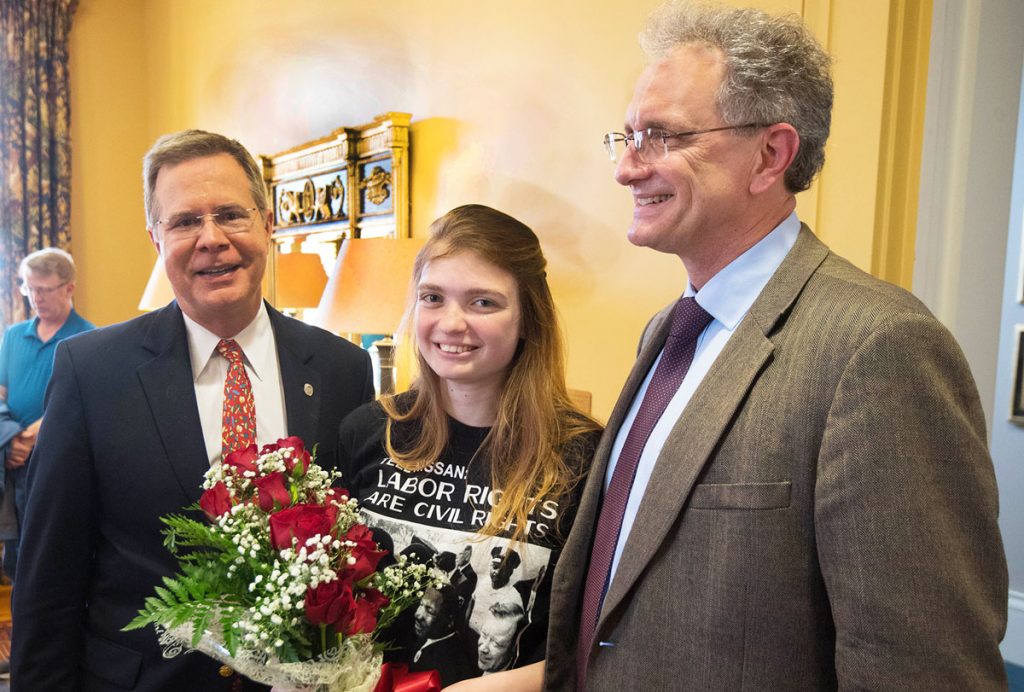A small, copper-colored chain with a wire hanger-shaped pendant dangles around her neck. Her long, red hair drapes over her shoulders, and her hands rest on her knees as she cradles a tall cup of iced tea. She is donned in a tan button-up shirt and a knee-length skirt embroidered with patterns of bright blue and green beads.
Her name is Jaz Brisack, and she is the university’s 15th Harry S. Truman Scholar.

Jaz Brisack is congratulated by Chancellor Jeffrey Vitter and Douglass Sullivan-Gonzalez, dean of the Sally McDonnell Barksdale Honors College, on being named the university’s 15th Harry S. Truman Scholar. Photo courtesy: Kevin Bain | Ole Miss Communications
A junior general studies major, Brisack considers herself a student activist and has been involved in many organizations, both on- and off-campus. Her accomplishments include being president of College Democrats and volunteering at the “Pink House,” the only clinic in Mississippi that provides abortion services. Brisack’s copper-colored necklace is a visceral reminder of why she is so involved in the community.
“Our job was to get women through abortion protesters and into the clinic safely. It is really powerful because it’s an uphill battle that has no cure, but getting women their right to an abortion is something you can see right in front of you,” Brisack said. “I think reminding myself about why I do this and reminding other people where we have come from and what we could go back to is important.”
Brisack was homeschooled and comes from a family of politically active educators. A self-proclaimed bookworm, Brisack became interested in union organizing and activism after reading the writings of historical figures and labor union organizers Eugene V. Debs and Mary Harris Jones.
Politics and activism may be Brisack’s blood. She revealed that, in addition to her parents’ activism in politics, her great-great-great-great grandfather had run for president of the United States.
“My entire family is pretty political, although I am the furthest left, by a bit,” she said. “In the 1880s, my fourth-great grandfather had run for president on the Union Labor ticket and got one percent of the vote.”
The Harry S. Truman Scholarship Foundation was created in 1975, and the Truman Scholarship is the foundation’s leading graduate fellowship program for those interested in pursuing careers in public service leadership. Recipients of the scholarship receive up to $30,000 for graduate school as well as access to resources such as internship opportunities and graduate school counseling.
Though three University of Mississippi students were selected as 2018 Truman Finalists, Brisack became the university’s 15th Truman Scholar as well as its first in eight years. Brisack is one of the 59 2018 recipients of the prestigious scholarship and was chosen from an application pool of more than 700 students from more than 300 different institutions.
However, it isn’t her family’s history or even her Truman Scholarship grab that makes Brisack most proud. In 2017, Brisack became deeply involved with the Canton Nissan Plant workers’ fight to unionize and formed a close bond with Morris Mocks, a pro-union Nissan worker. In 2018, Mocks, with Brisack’s support, ran in a state House special election for District 60.
“For him to put that type of trust in me, that really changed a lot of people’s expectations in Rankin County,” Brisack. “He was first black man to run and the first Democrat to run in over 20 years in that district. Neither of us expected him to win, but we both hoped that some miracle could happen. We thought that challenging the Republican stranglehold was important.”
After completing her general studies degree, which focuses on public policy leadership, journalism and English, Brisack is looking to defer her Truman Scholarship to complete an internship with a labor union in Washington. Afterwards, she plans to pursue law school or a Master of Fine Arts in creative writing.
“Every Truman Scholar I’ve talked to says (the scholarship is) the least part of it. Once you become a Truman Scholar, you become a part of the Truman network,” she said. “I’ve already gotten a lot of calls and messages from a lot of former Mississippi Truman Scholars.”
Brisack credits the Sally McDonnell Barksdale Honors College and a few university professors, journalism professor Joseph Atkins and speech and debate coach JoAnn Edwards, for catapulting her onto her current path of activism. These instructors’ persistence gave Brisack the extra push she needed to complete the extensive application and interview process for the Truman Scholarship.
“I never heard of the Truman Scholarship, but within the first couple weeks of class, my debate coach, JoAnn Edwards, mentioned it to me. She was the first person that told me about it, and the way that I got to put all theoretical labor ideals into practice (exists) because I learned about Joe Atkins and took his classes,” Brisack said.
Overall, Brisack said her time at the University of Mississippi has been both rewarding and challenging. After finding a community of people with similar priorities and outlooks, she was able to fully realize her purpose, and she plans to continue challenging the status quo.
“I don’t know how to say this without sounding cliche, but like Fannie Lou Hamer said, ‘nobody’s free ‘til everybody’s free.’ I think that this place could be so much better,” Brisack said. “Being here and being part of selective things like the Honors College is a privilege that obligates me to speak out.”






